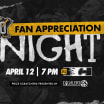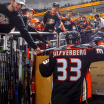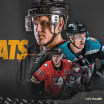It isn't often Paul Kariya walks through the doors of Honda Center these days, ironic since it's the place he made his living for almost a decade when it was called the Arrowhead Pond of Anaheim. It's where countless fans - many of whom were new to hockey at the time - marveled at his breakneck speed, the way he shot the puck, the way he constantly made his teammates better.
Kariya Remains Humble About Having His Jersey Retired
The Ducks legend reflected on the honor during a visit to Honda Center in advance of the ceremony Sunday at 3:15 p.m.
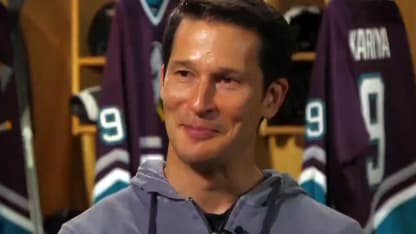
It's the place where Kariya was at the center of one of the iconic moments in his career, Ducks history and Stanley Cup Final lore, where ABC play-by-play announcer Gary Thorne's call of "Off the floor! On the board!" is almost as timeless as the moment itself. It was Kariya miraculously returning from a blindside hit by New Jersey's Scott Stevens in Game 6 that knocked Kariya cold, only to see him return to the game and rip a slap shot from the left wing that found the net and nearly blew the roof off Honda Center.
Few could have known at the time that would be Kariya's final game in the building, with an exit that summer landing him with the Colorado Avalanche. His subsequent visits to Honda Center were limited to visits with the Avalanche, the Nashville Predators and St. Louis Blues, until concussions led to his premature retirement from the game in 2011.
Since then the notably private Kariya, who frequently shies from the spotlight, has accordingly been in the building rarely. He did attend good friend Teemu Selanne's final regular season game in 2014, joined 21st Duck Kai Quinonez to paint a symbolic X for a Ducks playoff win in 2016 and was honored with Selanne for their Hall of Fame inductions a year ago.
But there was Kariya inside Honda Center earlier this week for a special lunch and some promotional activities in preparation for this weekend, where his number 9 will be raised to the Honda Center rafters in what promises to be an emotional ceremony Sunday afternoon at 3:15 p.m.
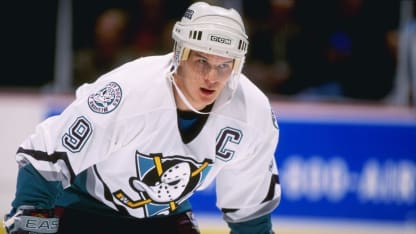
Kariya arrived to the event in a grey zip-up sweatshirt and jeans, his appearance as casual and easygoing as his demeanor throughout the afternoon. The man with the famously reticent reputation - who is self-described as having the opposite personality of the endlessly charming Selanne - was charismatic and jovial throughout the afternoon as he told old stories and reflected on the wonder of having his number retired by the franchise that gave him his start in the NHL.
The few times he appeared unnerved was when broaching the topic of that honor - of joining Selanne as the only two players to have their numbers retired by the Ducks.
"I would never ever think or say that I was deserving or something like this, and I don't think that will ever change," he said while sitting in the middle at a long table in the dining room of Honda Center's Shock Top Terrace. "It certainly means a lot to me that Henry and Susan Samueli and the Ducks organization would feel I'm deserving of this recognition. It's incredible, and definitely not something I would feel I was deserving of."
Kariya's banner will go up next to Selanne's and in February they will be joined by Scott Niedermayer, who captained the 2007 Stanley Cup champion Ducks. "To [have my jersey retired] with Teemu and later Scott," Kariya said, "anytime you can be in the same breath as two legends of the game like that, it's mind-boggling to me."
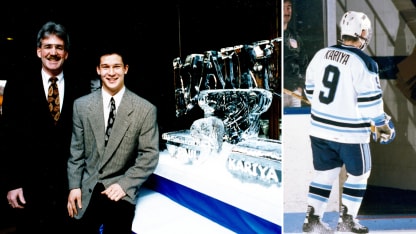
Kariya scored 989 points in 989 games in the NHL with the Anaheim, Colorado, Nashville and St. Louis. He is among Ducks franchise leaders in nearly every offensive category, leading in points per game (1.10), ranking second in power-play goals (107) and third in goals (300). He's a two-time Lady Byng Memorial Trophy winner, notched 100-point seasons twice and had a 50-goal season in 1995-96.
And yet, "I would never consider myself to be deserving of any recognition, and certainly not one of this magnitude," he said.
When Kariya was reminded how much he has meant to the organization - the first draft pick in team history, the first superstar, the one who put the Mighty Ducks on the map - he struggled for a response.
"Well, it's always very special to hear someone say, 'You were the first jersey I bought' or 'I started watching the game when you started to play for the Ducks.' Things like that are incredibly meaningful to me and always will be. I just don't think in those terms of being the first or anything like that, but I'm grateful people see me in that way. I'm very flattered people see me like that. I'll be getting ice cream and someone will say, 'I was there in Game 6' or some other memory. That's awesome. It's great to be remembered at all, and that never gets old."
Kariya's humility stems from a disciplined upbringing by parents Tetsuhiko ("T.K.") and Sharon, who were both schoolteachers in Kariya's hometown of Vancouver. T.K. was a Japanese-Canadian born in a WW II internment camp in British Columbia and helped instill a team-first refrain in Paul and his four siblings.
"Growing up, as a kid, when I started playing team sports, if we would have ever said we didn't get enough ice time or playing time, it would be shut down by my parents in a heartbeat," Kariya said. "It would be, 'Do as your coach says. When you're playing team sports, it's the team first and not yourself.' I was always taught that you do what you can to help your team win, and that individual recognition will come when the team success comes, not the other way around."
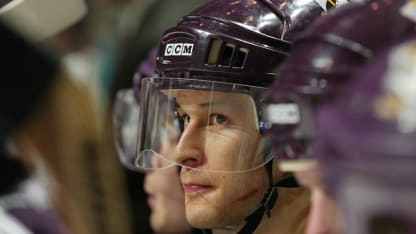
Kariya's stature with the greats of the game is mind-boggling to him, since "In my mind, I'm still the guy with Wayne Gretzky and Brett Hull poster in my room, and looking up to them."
He remembers being overwhelmed by the moment of playing his first All-Star Game in 1996 on a line with Grezky and Hull, something he calls "one of the highlights of my career. To start an All-Star Game with two of your greatest idols, it was unbelievable. These are guys you look up to and I watched videos of them and studied the way they played.
"You get drafted and then it looks like you might get an opportunity to play in the league, and the next thing you know you're at center ice in the All-Star Game with them. It happens so fast. I look back at stuff like that, and sometimes I wonder, How did that happen?"
That leads Kariya into another story from his days in Nashville, when young teammate Scottie Upshall came into the room one day and showed Paul a keepsake from his childhood. "It was a book report he did on me when he was a kid," Kariya says with a chuckle. "I don't remember the grade but I think he got a C on it. I was like, 'Oh my God, I'm old.' That was my thought. I didn't see myself like that, like a veteran player or an old player. But it's very flattering and embarrassing. Because I did a book report on Wayne Gretzky at one time."
Kariya was quick-to-laugh throughout most of the lunch, sometimes uncontrollably, like when he talked of him and Selanne playing on a line with workhorse center Steve Rucchin. Both Kariya and Selanne have quipped how Rucchin did all the dirty work on that line while the two of them grabbed the glory with highlight-reel goals and slick feeds - usually to each other.
"The greatest was our warmups with Rucchin," Kariya said, fighting for air between chuckles. "We would saucer the puck over his stick the entire way down the ice, then turn around and do the same thing the entire way back. Rucchin would get so [ticked] off."
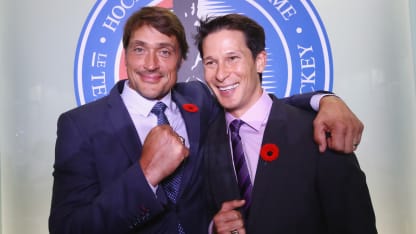
Kariya admits he had a tough time adjusting to his walking away from the game in 2011, which was advised by doctors after multiple concussions suffered over a 15-year NHL career. "When I retired, obviously it was very tough," he said. "I wasn't ready and had no plans at that point. It took a long time for me to feel right about life itself, but I don't think that way anymore."
He underwent treatment ("The brain is like anything else, when it's injured, you need to take some steps to get it back") and says he's come to terms with the direction his life has taken.
"I'm very happy. I'm healthy, loving what I do and blessed to be with great people and great friends and great people around me," he says.
He and his longtime partner Val live in south Orange County, where Kariya surfs several times per week, travels frequently and finds interest in taking on new challenges. That doesn't include, he insists, getting into coaching or broadcasting.
"With hockey, I loved doing it, and as I've said many times, if I could, I'd still do it," he said, pointing out that the first and last time he played since retirement was in an exhibition game at Hall of Fame weekend last November. "I did enjoy getting back on the ice, for sure, but now I'm into learning new things.
"As you get older, I think it's important to constantly challenge yourself and not be stuck in the same thing you've been doing awhile. Try a new sport or try something totally weird and be a beginner again. Mix it up and do something different."
That has included taking up skiing, learning how to snowboard and recently getting into a new form of riding the waves called foil surfing. He's learning Japanese, Spanish and French using a language mobile app.
"I think that's so valuable, keeps you young, keeps your mind active and keeps you enthused," he says of learning new skills. Anything where people are pushing the envelope, learning something new and doing something new, those kinds of things inspire me now."
His health, he says, is better than ever, evident by his svelte, athletic frame and youthful appearance he still carries at the age of 44.
"I feel like I'm as healthy as I've ever been in my life," he said. "I think Val might disagree when she watches me forget where my keys are, but I think that happens to everybody. There are more things you can do to keep your mind sharp, to keep your memory sharp.
"With technology nowadays, it's almost like where society is trying to take the intellect away from people. You're not able to have a conversation or look someone in the eye and speak anymore. You're always on your phone. People also don't write anymore. I never go to my phone contacts for phone numbers. I try to remember them, just little things like that to stay sharp."
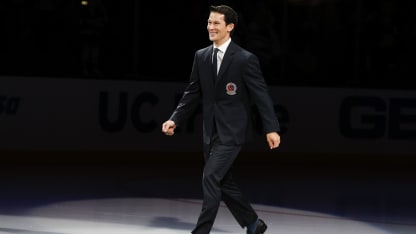
© Debora Robinson/Getty Images
When the prospect of having Kariya's number retired was broached in recent years, it was met with enthusiasm from Ducks fans on social media and beyond. Kariya says he has maintained a great relationship with those around the area. "The people here have always been fantastic to me and welcomed me from day 1," he said. "This is my home, and I could never see myself not living here. In terms of my relationship with fans and people in Orange County, it's always been fantastic."
Thousands of those fans will be in the building Sunday to watch the giant banner climb to the Honda Center rafters depicting Kariya's famous number 9. The origins of the number don't hold extreme significance, other than it was given to him at the University of Maine by late great coach Shawn Walsh (and 9 is frequently given to a hockey team's best player).
"I never was superstitious about numbers at all. I wore every number," Kariya said. "Shawn gave me that at Maine, and I wore it ever since. Maybe they knew that I was a Gretzky fan. Or maybe it was because of Gordie Howe. There are a lot of good number 9s over the years. Nobody ever asked me about it or anything. Even when I went to different teams, they just gave it to me."
That's where former Ducks goalie and current broadcaster Guy Hebert chimed in from a few seats down at the table. Hebert played in the Ducks' inaugural 1993-94 campaign when Kariya was still at Maine, and Kariya didn't join the team for his rookie year until the following season.
"We were told that number 9 was saved," Hebert said, "so no one could have that number that first year."
Nobody in a Ducks uniform will ever wear that number again, a distinction Kariya still has trouble grasping.
"It's just something I could never wrap my head around, but I'm very grateful and honored that they feel I deserve it," he said. "It's going to be a great weekend and a great night, and I'm looking forward to saying thank you to the fans and the organization for giving me the honor."









